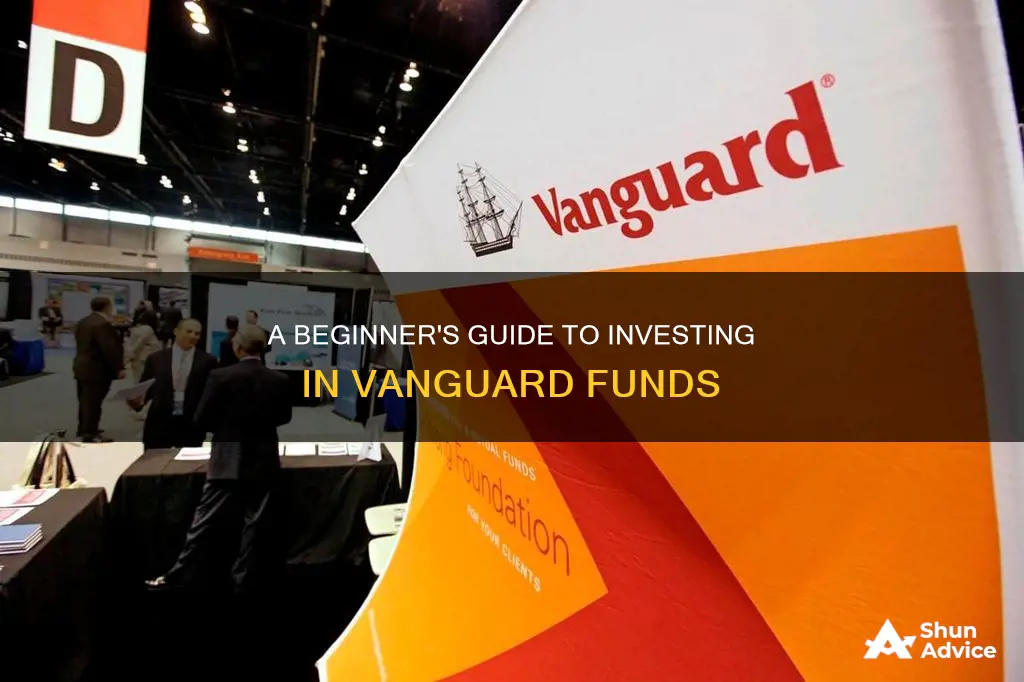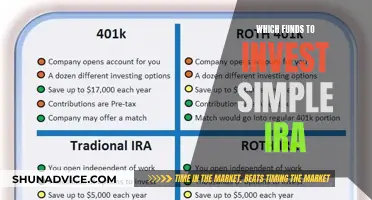
Investing in Vanguard funds can be a straightforward process, but it's important to do your research first. Vanguard is one of the largest and most well-respected investment firms in the U.S., known for its low-cost model and large fund selection. The company offers a wide range of mutual funds and exchange-traded funds (ETFs) to choose from, spanning various asset classes, including money market funds, bond funds, stock funds, and target-date funds. When deciding how to invest in Vanguard funds, it's essential to consider your financial goals, risk tolerance, and the level of diversification you want in your portfolio. Beginner investors should focus on funds with low fees and broad diversification to minimize risk. Additionally, Vanguard's trading platform and investment minimums may be limiting factors for some investors, particularly those who are more active traders.
| Characteristics | Values |
|---|---|
| Number of mutual funds | Over 130 |
| Investment options | Stocks and Shares ISA, Personal Pension, Junior ISA, General Account |
| Minimum investment | £100 per month or a £500 lump sum |
| Investment limits | Vary by account |
| Tax advantages | Vary by account |
| Investment goals | Dependent on your risk attitude and account type |
| Fund selection | Vanguard can choose funds for you based on your risk attitude |
| Initial minimum investment | $1,000 to $3,000 |
| Expense ratio | 0.08% to 1.8% |
| Account options | Traditional or Roth IRA, taxable account |
| Brokerage options | Vanguard, TD Ameritrade, Fidelity, E*Trade, Charles Schwab |
What You'll Learn

Choose an account type based on your savings goal
Choosing an account type is easy when you know your investment goals. There are several types of accounts, each with different features and benefits. Here is a detailed look at some of the account types Vanguard offers, so you can choose the one that aligns with your savings goals:
General Investing Accounts
General investing accounts are flexible and can be used for any financial goal. They are not restricted by early withdrawal penalties, so you can access your money whenever you need it. This type of account is suitable for short-term goals, such as saving for a dream home, wedding, or other significant milestones. General investing accounts are also known as individual or joint brokerage accounts.
Retirement Accounts
Retirement accounts are specifically designed for saving for retirement and offer various tax advantages. Traditional and Roth IRAs are popular options, with different tax benefits. Traditional IRAs allow you to contribute pre-tax dollars, while Roth IRAs offer tax-free earnings and no requirement to distribute assets during your lifetime. Both types of IRAs generally impose a 10% penalty tax on distributions before the age of 59 1/2.
Employer-Sponsored Retirement Plans
If you are employed, you may have access to employer-sponsored retirement plans such as 401(k)s or 403(b)s. These plans allow you to make pre-tax contributions directly from your wages. Some employers may also offer Roth 401(k) plans, which are contributed to with after-tax money.
Small Business Retirement Plans
If you are self-employed or own a business, Vanguard offers specific retirement account options. These include the Simplified Employee Pension (SEP-IRA) and the Individual 401(k). If you have employees, you may also want to consider a SIMPLE IRA (Savings Incentive Match Plan for Employees).
Education Savings Accounts
If you are saving for future education costs, either for yourself or your children, you may want to consider a 529 savings plan or an UGMA/UTMA account. A 529 plan is a tax-advantaged account that allows families to save for education expenses, including tuition, room and board, and supplies. UGMA/UTMA accounts are owned by minors but managed by adults until the minor reaches adulthood, after which the money can be used for any purpose.
Brokerage Accounts
Vanguard also offers brokerage accounts, which allow you to buy and sell various investment options, including stocks, bonds, mutual funds, and exchange-traded funds (ETFs). Brokerage accounts are suitable for those who want to actively invest and build a diverse portfolio.
Invest Wisely: Kotak Select Focus Fund Guide
You may want to see also

Decide how much to invest
When deciding how much to invest in Vanguard funds, there are a few key factors to consider. Firstly, it's important to understand the basics of risk and return and how they relate to time. Different types of investments come with different levels of risk, and it's crucial to diversify your portfolio to lower this risk. Remember that all investments have costs, and choosing what to buy can have a significant impact on controlling these costs.
Vanguard offers a range of funds with different minimum investment requirements, so you can choose the one that best suits your financial situation. For example, the minimum investment for most actively managed Vanguard funds is $3,000, while certain sector-specific index funds require a minimum of $100,000. Additionally, some funds charge purchase and redemption fees, typically ranging from 0.25% to 1.00% of the transaction amount. These fees are designed to protect long-term investors by discouraging short-term, speculative trading.
When deciding how much to invest, consider your financial goals and risk tolerance. Are you investing for retirement, saving for a down payment on a house, or something else entirely? How much risk are you comfortable with, and what is your investment time horizon? Answering these questions will help you determine how much you want to allocate to your Vanguard investments.
Remember that investing in Vanguard index funds provides instant diversification, which can help mitigate risk. Vanguard's funds track various market indexes, allowing you to invest in hundreds or even thousands of securities at once. This means that if some securities perform poorly, the other investments in the fund can help protect your investment.
Additionally, consider the fees and costs associated with different Vanguard funds. As of December 31, 2023, Vanguard's average mutual fund expense ratio was 0.09%, significantly lower than the industry average of 0.50%. No-load mutual funds, which Vanguard offers, also mean you don't have to worry about paying commissions when buying or selling fund shares.
By taking the time to understand your financial goals, risk tolerance, and the costs associated with investing, you can make an informed decision about how much to invest in Vanguard funds. Remember that investing carries inherent risks, and past performance does not guarantee future results.
Smart Guide: Invest in Low-Cost S&P 500 Index Funds
You may want to see also

Understand the different types of Vanguard funds
Vanguard is one of the largest and most well-respected investment firms in the US, with over $6.2 trillion in global assets under management. Vanguard offers a wide range of low-cost mutual funds, providing investors with options for strong performance and market diversification.
Money Market Funds
Money market funds are relatively low-risk investments. They invest in short-term securities issued by US corporations and federal, state, and local government agencies. These funds are a good option for those seeking lower-risk investments.
Bond Funds
Bond funds have a higher risk than money market funds but can provide stability to supplement stock investments. They buy and sell government and corporate debt, and they are considered safer investments, though they typically yield smaller returns.
Stock Funds
With stock funds, investors can put their money in domestic or international companies of all sizes and industries. This provides a wide range of options for investors to diversify their portfolios.
Target Date Funds
Target date funds invest in a mix of stocks, bonds, and other securities. As the target date approaches, the fund strategy becomes more conservative to reduce risk. These funds are designed to help investors save for future goals, such as retirement, by adjusting the investment strategy over time.
Index Funds
Index funds are passively managed, aiming to mirror the performance of a specific market index, such as the S&P 500 or Nasdaq. They buy securities that represent companies across an entire stock index or target specific groups, like industry sectors or similarly-sized companies. Vanguard's index funds are known for their strong performance and instant diversification benefits.
Actively Managed Funds
Actively managed funds aim to outperform a benchmark index. The fund manager actively selects securities according to the fund's criteria, leading to more trades and higher taxable capital gains. These funds generally have higher fees and require a higher minimum investment, typically $50,000.
Vanguard offers a diverse range of funds catering to different investor needs, from low-risk money market funds to actively managed funds seeking to beat the market. Each type of fund has its own characteristics, risks, and potential returns, so it's essential to understand these before investing.
A Guide to Investing in the S&P 500: Index Funds in Australia
You may want to see also

Compare Vanguard to other brokers
When comparing Vanguard to other brokers, it's important to consider factors such as fees, investment options, trading platforms, customer service, and security. Here's a detailed comparison between Vanguard and some of its competitors:
Vanguard vs Fidelity:
Fidelity and Vanguard are two of the largest investment companies globally, both with over 50 million investors. While Vanguard has $8.6 trillion in assets under management, Fidelity boasts $13.7 trillion. Here's how they compare:
- Usability: Vanguard's website has improved in user-friendliness, but it still falls short of Fidelity's, which offers more tools and resources. Opening an account with Vanguard also takes several days before you can start investing, while Fidelity offers a faster process.
- Trade Experience: Vanguard's platform caters to buy-and-hold investors rather than active traders. In contrast, Fidelity offers a better experience for all investor types, with its web-based platform and Active Trader Pro tools.
- Range of Offerings: Both brokers offer equities, bonds, options, ETFs, and thousands of no-load, no-fee mutual funds. However, Fidelity provides a broader range of investments, including Forex, precious metals, OTC, and fractional shares.
- Order Types: Vanguard supports basic order types for buy-and-hold investors, while Fidelity offers a wider range, including conditional orders.
- Trading Technology: Fidelity wins in this category due to its smart order routing technology and transparent execution speed statistics. However, Vanguard outperforms Fidelity in price improvement.
- Costs: Both brokers offer $0 commissions for online equity, options, and ETF trades. Fidelity charges $0.65 per contract for options, while Vanguard charges $1. Fidelity is more cost-effective for options trading, while Vanguard is better for mutual funds.
- Account and Research Amenities: Fidelity provides more comprehensive research offerings and tools, catering to a broader range of investor types.
- Education: Fidelity's online Learning Center offers a wider range of content for investors at various experience levels, giving it an edge over Vanguard in this category.
- Customer Service: Fidelity offers 24/7 phone support and online chat features, making it more accessible than Vanguard, which provides phone support during limited hours and no live chat.
Vanguard vs TD Ameritrade, Fidelity, E*Trade, or Charles Schwab:
According to Forbes, these brokers are alternatives to Vanguard when it comes to buying and selling Vanguard mutual funds through an online brokerage account. Here's what you need to consider:
- TD Ameritrade: Known for its comprehensive trading tools and resources, TD Ameritrade is suitable for active traders and investors seeking a wide range of investment options.
- Fidelity: As mentioned earlier, Fidelity offers a robust trading platform, excellent research tools, and a broad range of investment choices.
- ETrade: ETrade provides an intuitive trading platform with various investment options, making it a good choice for beginners and experienced investors.
- Charles Schwab: Charles Schwab offers a broad selection of investment options and is known for its advanced trading technology and robust research tools.
In summary, Vanguard stands out for its low-cost investment options, making it ideal for long-term and retirement investors. However, its trading platform and educational resources are limited compared to competitors like Fidelity, which offer more comprehensive tools and investment choices. When choosing a broker, consider your investment goals, risk tolerance, and the specific features and services that align with your needs.
UK Pension Funds: Where Is Your Money Invested?
You may want to see also

Learn how to open a Vanguard account
Opening a Vanguard account is a straightforward process. Here is a step-by-step guide to help you get started:
Select 'Open an account' on Vanguard's Personal Investor homepage:
On the Vanguard Personal Investor homepage, you will find an "Open an account" button. Clicking on this will direct you to the sign-up page.
Indicate if you are new to Vanguard:
If you are not already a Vanguard client, select "I'm new to Vanguard" on the account opening page.
Provide your personal information:
You will be required to share personal information, including your name, email, birthday, citizenship, social security number, address, and phone number. Vanguard employs security measures to ensure your data is safe.
Review and verify your details:
After entering your personal information, carefully review the details for accuracy. You will then create a username and password, agree to web terms and paperless documents, and set up security questions.
Add your bank account:
Connect your bank account by selecting your bank from a list of popular banks or searching for it manually. Ensure you select the correct bank, as some banks have similar names. If you are unable to log in to your bank, you can add it manually.
Decide on funding:
You can choose to fund your account immediately or at a later time. There is no cost to open an account, but some financial products have a minimum amount requirement. If you decide to fund your account now, enter the amount of your initial one-time bank transfer.
Provide employment information:
You will need to provide your employer's address and select any applicable requirements. Certain occupations may have additional rules and regulations.
Answer final questions:
You will need to answer some final questions, which are mandatory for all new brokerage accounts. These answers will not impact the products you can buy, and you can update them at any time.
Review and accept agreements:
Once you have reviewed your information, accept the agreements, and you will receive a confirmation that your Vanguard brokerage account is now open.
Congratulations! Your first investment will go into the settlement fund that comes with your new account. You can then use this money to purchase investment products. It may take 3-7 days, depending on the products you select.
Choosing an account type
Before opening your account, it is essential to consider the different account types Vanguard offers to determine which one aligns with your goals. Vanguard offers various accounts, including:
- Individual Retirement Accounts (IRAs)
- Joint non-retirement accounts
- SEP-IRAs for one person
- 529 education savings plans
- UGMA/UTMA accounts
- Small-business retirement plans
- 403(b) plans
Each account type serves different purposes, so it is worth reviewing their features and benefits to decide which one best suits your needs.
Getting started with investing
Once your Vanguard account is open, you can start investing by selecting your goal and a related account type. Your account will act as a container for your chosen investments, such as index funds, stocks, CDs, or ETFs.
Vanguard also provides resources to help you explore different investment options and decide which ones are right for you. You can refer to their website for more information on choosing funds, deciding how much to invest, and understanding the risks involved.
Norway's Wealth Fund: A Guide to Investing
You may want to see also
Frequently asked questions
You can open a brokerage account with Vanguard online. You can choose a taxable investment account, open an individual retirement account (IRA), a solo 401(k), SEP IRA, SIMPLE IRA, UGMA/UTMA or a 529 college savings account. The process takes just a few minutes, and you can link your bank account with your Vanguard account, or roll over funds from another investment account. Once the account is open, you can buy and sell mutual fund shares through your Vanguard account dashboard.
The minimum initial investment for Vanguard Target Retirement Funds and Vanguard STAR Fund is $1,000. A $3,000 minimum applies to most other funds.
Vanguard has more than 130 mutual funds to choose from in the following asset classes: money market funds, bond funds, stock funds, and target date funds.







